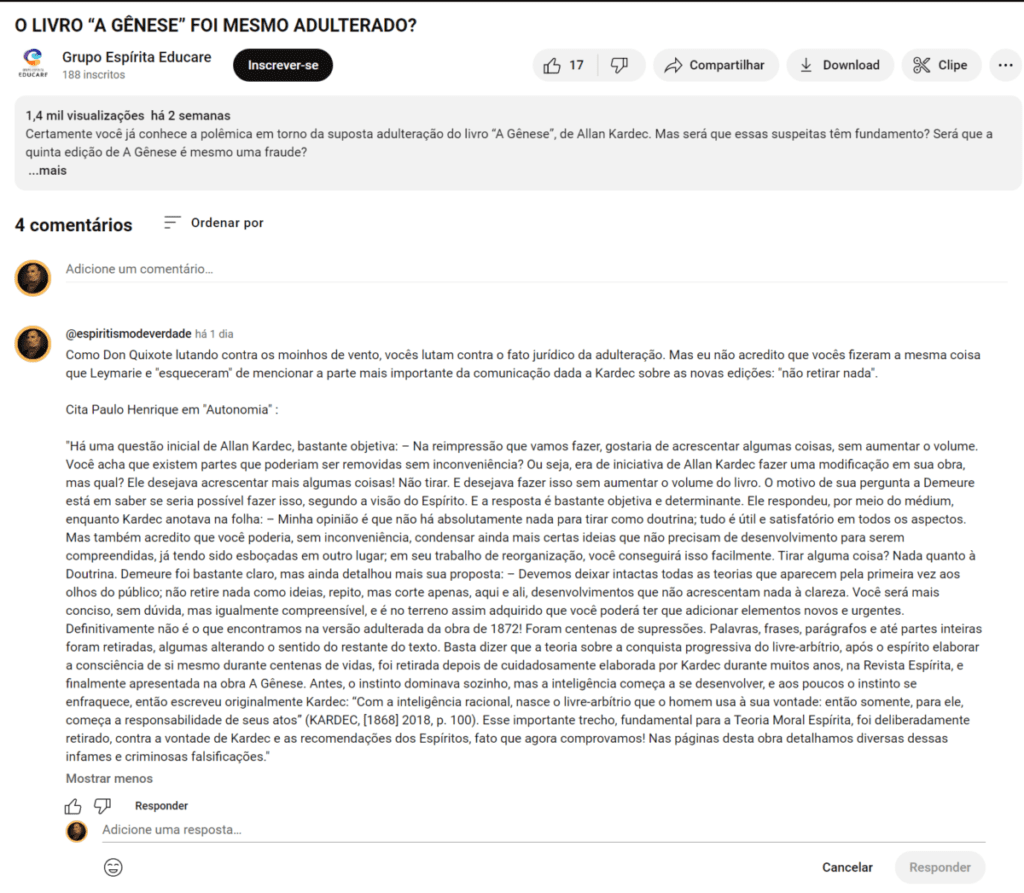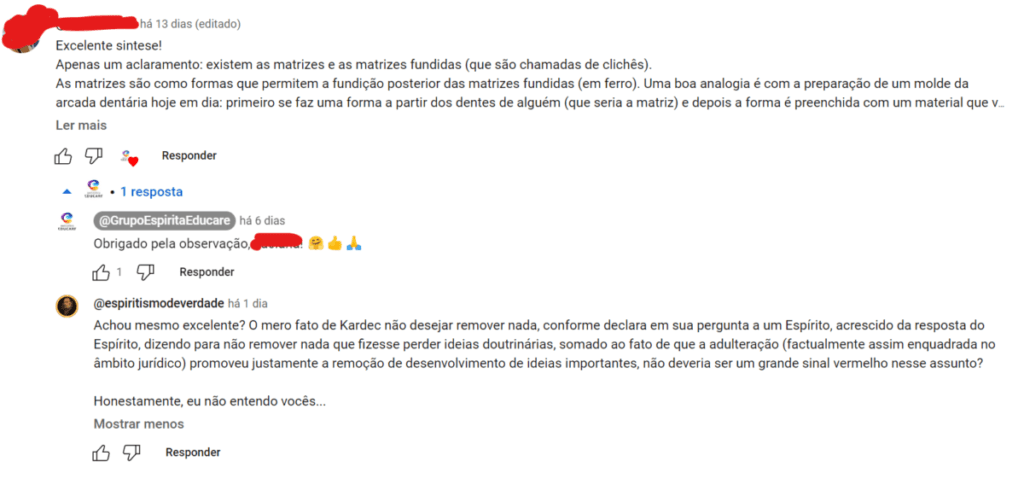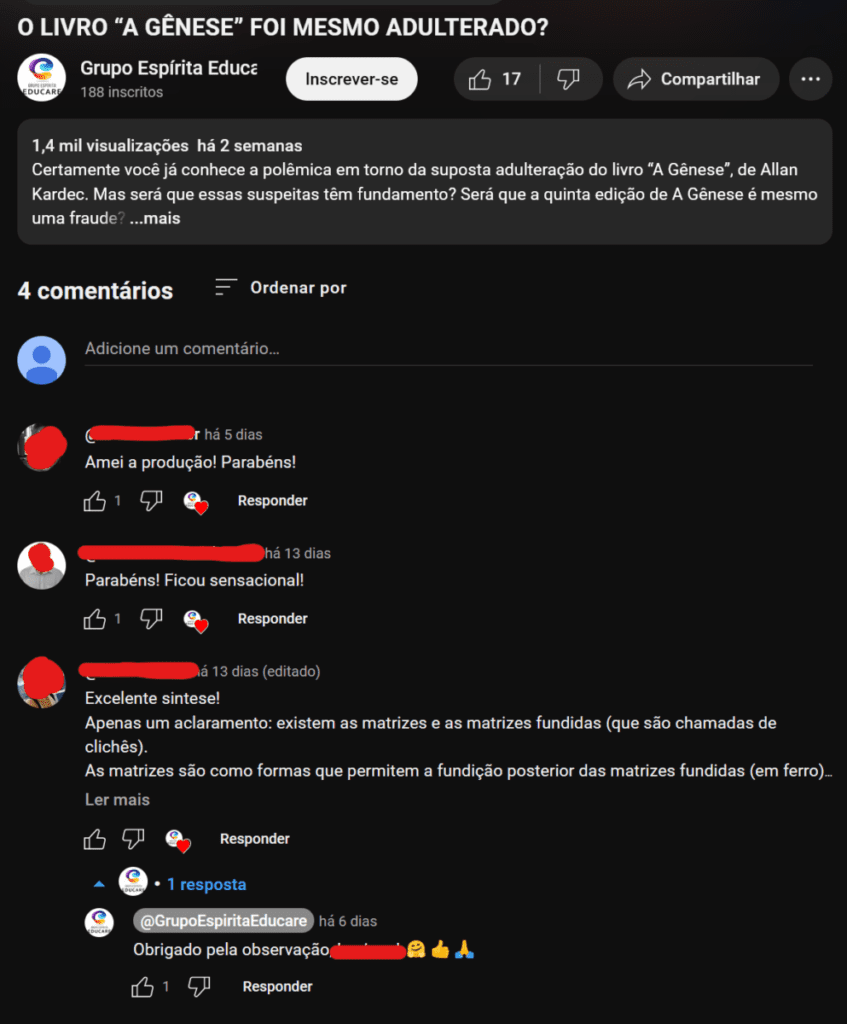The strongest evidence of tampering with Allan Kardec's Heaven and Hell
They are undisputed legal facts at tampering of A Gênesis and O Céu e o Inferno, for the mere reason that editions were released, with changes, after the death of the author and without legal deposit – this is what at least four specialized legal operators say: Simoni Private, Julio Nogueira, Lucas Sampaio and Marcelo Henrique. That cool fact it is above of any consideration and, because of this, spiritist federations from other countries, respecting the law, returned to the third edition of the work. Unfortunately, the Brazilian Spiritist Federation, having a lot to recapitulate when taking this attitude (since the original text of A Gênesis contradicts a multitude of errors that populate most of the publications edited and printed by it) still resists these facts, basing itself in layman arguments on copyright matters.
In addition to the legal fact and the necessary respect for the law, through the study we have just identified another piece of evidence, perhaps the most decisive of all, of the adulteration of Heaven and Hell, the work of Allan Kardec, precisely in the part that expressed the doctrinal philosophy in its clearest and purest face.
In The Spirits' Book, Kardec deals with the issue of spirits who have always chosen the path of good (we also dealt with this in the article "Intimate Reform and Spiritism“:
There are spirits who have always chosen the path of good
121. Why do some Spirits follow the path of good and others the path of evil?
“Don’t they have free will? God did not create evil spirits; He created them simple and ignorant, that is, having as much aptitude for good as for evil. Those who are evil became so of their own free will.”
133. The Spirits who From the beginning they followed the path of good?
“All are created simple and ignorant and are instructed in the struggles and tribulations of bodily life. God, who is just, could not make some happy, without toil and work, therefore without merit.”
The) - But, then, what is the use of spirits to have followed the path of good, if this does not exempt them from the sufferings of bodily life?
"They reach the end faster. Furthermore, the afflictions of life are often the consequence of the imperfection of the Spirit. The fewer imperfections, the less torment. He who is not envious, nor jealous, nor avaricious, nor ambitious, will not suffer the tortures that originate from these defects.”
The Spirits' Book. Emphasis added.
Confirmed by the Spirits, there are those who have always chosen the path of goodness, which does not free them from the need to incarnate for their development. Thus, they have nothing to atone for, since atonement is the conscious choice of tests and opportunities that help them to let go of imperfections they have consciously acquired (remembering that merely making a mistake is not acquiring imperfections, as long as the mistake is overcome through learning. What generates imperfections is the conscious repetition of the mistake).
Furthermore, it is only logical that those who have overcome an acquired imperfection through atonement have nothing more to atone for, except if they develop new imperfections. Even so, they may need to be born on a planet like Earth, simply because their current needs demand it or because they choose to incarnate on a mission. Jesus Christ himself is the ultimate example of the latter, and even though he was a pure Spirit, he still faced the vicissitudes of matter without having anything to atone for. Look where admitting these false ideas leads: to the dogma of Spirits created apart and who have never actually been among us (a dogma supported by Roustaing)!
Strong evidence of tampering with Heaven and Hell
And here we come to the proof of the adulteration of Heaven and Hell, which, in the edition released after Kardec's death, introduced two items in chapter VIII (which became chapter VII):
9th — Every fault committed, every evil done, is a debt contracted that must be paid; If it is not so in one existence, it will be so in the next or subsequent ones, because all existences are in solidarity with each other. Whoever pays it off in the present existence will not have to pay a second time.
10 - The Spirit suffers the penalty of its imperfections, whether in the spirit world or in the corporeal world. All the miseries, all the vicissitudes we endure in corporeal life are the result of our imperfections, expiations of faults committed, whether in the present existence or in previous ones.
Heaven and Hell, fourth edition. FEB. My emphasis.
These two items, I repeat, did not exist in the third edition of the work, released and printed by Kardec during his lifetime. To admit that Kardec included these items in that edition, especially item 10, would be to admit that Kardec contradicted everything he had developed up to that point.
To support this false idea, the following paragraphs were removed in the adulteration, in chapter IX (formerly chapter X):
In the first stages of their existence, spirits are subject to material incarnation, which is necessary for their development, until they have reached a certain level. The number of incarnations is indeterminate and is subordinate to the speed of progress, which occurs in direct proportion to the work and good will of the spirit, who always acts according to their free will. Those who, due to their carelessness, negligence, obstinacy or bad will, remain in the lower classes for longer, suffer the consequences, and the habit of evil makes it difficult for them to get out of this state. One day, however, they get tired of this painful existence and the suffering that comes with it. Then, when they compare their situation to that of the good spirits, they realize that their interest lies in doing good and they try to improve themselves, but they do so of their own free will, without being forced to do so. They are subject to the law of progress because of their ability to progress, but they don't do it against their will. God constantly provides them with the means to progress, but they are free to take advantage of them or not. If progress were obligatory, spirits would have no merit, and God wants everyone to have the merit of their works, privileging no one with the first place, a position granted to all, but which they achieve only through their own efforts. The highest angels earned their position by traveling the same route as everyone else. Everyone, from the top to the bottom, has belonged or still belongs to humanity.
Men are therefore more or less advanced incarnate spirits, and spirits are the souls of men who have left their material shell. Spiritual life is the normal life of the spirit. The body is nothing more than a temporary garment, appropriate to the functions it must perform on Earth, just as a warrior puts on his armor and chain mail for the moment of combat, then takes them off after the battle, only to put them on again when the time comes for a new fight. Corporeal life is the battle that spirits must face in order to advance, so they put on this armor which is both an instrument of action and an embarrassment.
When they incarnate, spirits bring with them their inherent qualities. Imperfect spirits therefore make up imperfect people; those who are more advanced, good, intelligent, educated, are instinctively good, intelligent people who can easily acquire new knowledge. In the same way, when people die, they provide the spirit world with good or bad, advanced or backward spirits. The corporeal world and the spiritual world thus constantly supply each other.
Among the evil spirits there are those who have all the perversity of demons, to whom we can perfectly apply the image we have of the latter. When they are incarnate, they are perverse and cunning men who delight in evil, seemingly created for the misfortune of all those who are drawn into their intimacy, and of whom it can be said - without it being offensive - that they are demons incarnate.
Having reached a certain degree of purification, spirits are given missions compatible with their advancement, thus performing all the functions attributed to angels of different orders. As God has always created, there have always been enough spirits to meet all the needs of the government of the Universe. A single species of intelligent beings, subject to the law of progress, is therefore sufficient for everything. This unity in creation, together with the idea that everyone has the same common origin, the same path to follow, and that they all rise by their own merit, corresponds much better to God's justice than the creation of different species, more or less favored by natural gifts, equivalent to privileges.
Heaven and Hell – Editora FEAL
More evidence of the original idea
Below are some more excerpts from Kardec's work that show the true understanding of the subject (incarnation is not exclusively the result of atonement):
According to a system that is somewhat specious at first glance, spirits were not created to incarnate and incarnation would only be the result of their lack. Such a system is undermined by the mere fact that if no spirit had failed, there would be no human beings on Earth or on other worlds. Now, since man's presence is necessary for the material improvement of the worlds; since he contributes by his intelligence and activity to the general work, he is one of the essential cogs in Creation. God could not subordinate the accomplishment of this part of his work to the eventual fall of his creatures, unless he counted on an ever-sufficient number of guilty people to provide laborers for the worlds created and yet to be created. Common sense rejects such an idea.
KARDEC. Spiritist Review - 1863 > June > On the principle of the non-retrogradation of the Spirit. Emphases added.
In this article, in this passage, Kardec is evidently firmly refuting the same idea conveyed in Roustaing's Four Gospels (which would only be released in 1865), that incarnation would only take place for atonement, that is, when the Spirit is "guilty":
The idea of incarnation as punishment, we said, is an idea totally linked to Roustaing's dogmas:
N. 59. Which is what we should think of the opinion that goes like this: "In the same way that, for the Spirit in a state of formation, materialization in the mineral and vegetable kingdoms and in the intermediate species, and likewise incarnation in the animal kingdom and in the intermediate species, is a necessity and not a punishment resulting from a fault committed, so, too, for the formed Spirit, which already has independent intelligence, awareness of its faculties, awareness and freedom of its actions, free will and is in a state of innocence and ignorance, incarnation, first in primitive lands, then in the lower and higher worlds, until it has reached perfection, is a necessity and not a punishment"?
"No, human incarnation is not a necessity, it's a punishment, we've already said that. And punishment cannot precede guilt."
The Spirit is not humanized, we have already explained this, before the first lack subjected it to human incarnation. Only then is he prepared, as we have already shown, to suffer the consequences.
ROUSTAING, Jean B. Four Gospels, Tome I, item 59
It's easy to see the similarity between this idea and the one introduced in the 4th edition of Heaven and Hell: that incarnation only takes place when the Spirit is guilty of a previous error.
Let's continue with the evidence of Kardec's original idea and the Doctrine:
132. What is the purpose of the incarnation of spirits?
"God imposes the incarnation on them in order to bring them to perfection. For some, it is an atonement; for others, it is a mission. But in order to reach this perfection, they have to suffer all the vicissitudes of bodily existence: that's the atonement [...].
The Book of Spirits
For some, it's atonement; for others, it's a mission. "In order to achieve this perfection, they have to suffer all the vicissitudes of bodily existence: that is what the atonement is," in other words, the atonement, treated in the religious world as a process of remission of sins by divine punishment, here, for Spiritism, is just the process of learning and development of the Spirit.
However, fatality is not an empty word. It exists in the position man occupies on Earth and in the functions he performs there, as a result of the kind of life his Spirit has chosen as a test, atonement or mission. He fatally suffers all the vicissitudes of this existence and all the good or bad tendencies that are inherent to it.
The Book of Spirits
The Spirit suffers the vicissitudes of the existence chosen by the Spirit, as a test, atonement or mission.
- Is incarnation a punishment and are only guilty spirits subject to it?
Spirits' passage through corporeal life is necessary so that they can fulfill, through material action, the designs that God has entrusted to them. It is necessary for their own sake, since the activity they are obliged to carry out helps them to develop their intelligence. Being sovereignly just, God has to distribute everything equally to all his children; that's why he has established for everyone the same starting point, the same aptitude, the same obligations to fulfill and the same freedom to proceed. Any privilege would be a preference, an injustice. But incarnation is only a temporary state for all spirits. It is a task that God imposes on them when they begin life, as their first experience of the use they will make of their free will. Those who perform this task with zeal quickly and less painfully pass through the first stages of initiation and enjoy the fruits of their labors sooner. On the other hand, those who misuse the freedom that God has given them slow down their progress and, no matter how obstinate they are, they can prolong the need for reincarnation indefinitely, in which case it becomes a punishment. - St. Louis (Paris, 1859)
KARDEC. The Gospel according to Spiritism > Chapter IV - No one can see the kingdom of God unless they are born again > Instructions from the Spirits. > Necessities of incarnation. > 25. Our emphasis.
Of course, the Spirits show that incarnation is necessary for everyone, so that while they develop, they play their part in Creation.
Examples of immediate punishment are less rare than you might think. If we were to go back to the source of all the vicissitudes of life, we would almost always see the natural consequence of some fault committed. Man receives terrible lessons at every moment, which unfortunately he makes very little use of.
The Spiritist Review, 1864
Almost always the sources of all the vicissitudes of life go back to the natural consequence of some fault committed.
[The good man] Knows that all the vicissitudes of life, all the pain, all the disappointments, are trials or atonements, and accepts them without murmuring.
The Gospel According to Spiritism
All the vicissitudes of life are trials or atonements. Trial: everything that helps us learn, all of life's difficulties. Atonement: certain types of trials, chosen to exercise detachment from an acquired imperfection.
"The disciples' question 'Is this man's sin the cause of his being born blind' indicates an intuition of a previous existence. Otherwise, it wouldn't make sense, because the sin that would be the cause of a birth defect would have to have been committed before birth and, consequently, in a previous existence. If Jesus had seen a false idea there, he would have said: "How could this man have sinned before he was among us?" Instead, he told them that if the man is blind, it doesn't mean that he has sinned, but in order for God's power to shine in him; it's like saying that he should be the instrument of a manifestation of God's power. If this was not an atonement for the past, it was a test that should serve his progress, because God, who is just, could not impose suffering on him without compensation."
KARDEC, Allan. The Genesis. 4th edition. “Blind from Birth”. Emphasis added.
In this passage, where Kardec deals with Jesus' healing of blindness, he makes the following observation: "If this was not an atonement for the past, it is proof that it should serve your progress". This means that for him, and in accordance with Spiritism, vicissitudes are not only an atonement, but also a learning tool. This passage even appears in the 5th edition of Genesis (the adulterated edition), and Kardec cannot have contradicted himself in his ideas in each of his works. This is not the Kardec we know.
Reason for adulteration
Anyone who is seriously investigating the subject, and who has also investigated the adulteration of Genesis, will notice something in common between the two adulterations: the principle of the dogma of incarnation as the result of punishment for sin - a strongly limiting and imprisoning dogma, echoed by Roustaing and taught by the mystifying spirits who communicated with him through the medium Emilie Collignon. Contra a sua teoria, existe um simples detalhe: Jesus.
Jesus, the most evolved Spirit ever to incarnate among us, had nothing to "pay", since he was a pure Spirit. How can this problem be solved? By saying that Jesus didn't incarnate, but was in fact an agenere, that is, a materialized Spirit, who simply deceived us throughout his trajectory.
The point is that, in Heaven and Hell, the doctrinal ideas that showed incarnation as necessary for everyone, good and bad, were removed, and the idea that everything we go through is the result of atonement for mistakes in past lives was added (item 10, chapter 7, Penal Code of the Future Life); in the adulteration of Genesis, not by chance, item 67 of chapter XV was removed and, as Henri Netto demonstrates,
[…] the renumbering of item 68 as if it were item 67 hides the logical assessment (albeit in terms of suppositions) of the fate of Yeshua's bodily envelope after his burial. What would be Kardec's reason, after repelling the docetist thesis ("fluidic body" of Jesus), and affirming his human nature, for suppressing his judicious considerations on the subject?
NETTO, Henri. In search of doubt: where is the truth? Published on the Espiritismo com Kardec – ECK website, on 12/24/2023. Available in comkardec.net.br/a-procura-da-duvida-onde-esta-a-verdade-por-henri-netto
In other words: in Genesis, in order to support the adulterations of Heaven and Hell, the idea that demonstrates, by unequivocal example, that incarnation is not just for atonement (adding here that atonement is the conscious act of choosing trials with the aim of returning to goodness, for those Spirits who, in the minority, chose to be attached to error and thus developed imperfections) was attacked. A doctrinal idea has been removed, even though the recommendation of the Spirit who communicated to Kardec on the subject of the new edition was not to remove anything related to doctrinal ideas.
Conclusion
Either Kardec made this change, or he didn't make this change. If he made this change himself, then he contradicted his entire previous understanding and, furthermore, he demonstrates an altered state of mental health, since he contradicted this idea in A Gênese, including in its fifth edition, as we demonstrated above.
Now, knowing that Kardec makes his understanding very clear that incarnation cannot be the exclusive result of atonement, and knowing his state of sound mental health up until the day of his death, we can only come to one conclusion: this work has been tampered with.
The change is very clear: "All the miseries, all the vicissitudes that we endure in corporeal life are the result of our imperfections, expiations of faults committed." This is clearly Roustaing's idea. This is clearly Roustaing's idea, and the essence of this chapter has been lost with the alteration, in order to implement the same dogmas that this gentleman accepted and defended:
"No, human incarnation is not a necessity, it's a punishment, we've already said that. And punishment cannot precede guilt."
ROUSTAING, Jean B. Four Gospels, Tome I, item 59
Many will say that item 16 of chapter VII of Heaven and Hell (the adulterated version) contains the same principle removed from the original item 8:
16 - Repentance is the first step towards perfection; but it alone is not enough; atonement and reparation are still needed.
Repentance, atonement and reparation are the three conditions necessary to erase the traces of a fault and its consequences.
El arrepentimiento suaviza el dolor de la expiación, dando esperanza y preparando el camino para la rehabilitación; pero sólo la reparación puede anular el efecto destruyendo la causa; el perdón sería una gracia, no una anulación.
However, we ask: what do repentance, atonement and reparation become, when subjected to the ideas inserted by adulteration, if not the fulfillment of a sentence or a punishment? What does error, part of learning, become if not a condemnation? And, looking at it from this angle, we ask: the individual who is led to think this way, how does he act towards life? Does he or she act austerely, trying to overcome the mistake, or, believing himself or herself condemned, does he or she submit to inaction or, worse, slip into even more mistakes? What about your neighbor, who is suffering the vicissitudes of life? Do you see in them a brother or sister who needs our support, a being capable of overcoming their difficulties through learning, or do you see in them another condemned person, about whom nothing can be done, since they are serving their sentence? Finally: does all this lead to a state of cooperation, in search of progress, or does it lead to materialism and selfishness?
These are questions that everyone has to ask themselves, in possession of the knowledge that, for me, took three years to clarify and establish. Maybe, with all this, I can help to shorten that time for you.
Enemies of good strive to delay it
It is very clear that the most important chapter of Heaven and Hell, precisely the one that contained the essence of the doctrinal philosophy, was deliberately adulterated. The ideas originally established were completely remodeled according to dogmas linked to the idea of the fall through sin, delaying the development of Spiritism on the face of the Earth by more than 150 years. Enough. Now it's time to recover and study. We recommend reading our Recommended Works.
The efforts of those who try to master the truth are linked to old-world conceptions. They are spirits who are still incapable of understanding the essence of Spiritism and who, consciously or not, are fighting against its ideas of autonomy and freedom. As Kardec would say, let time take care of them.
They claim to have summarily proved that there was no tampering and thus refuted all evidence to the contrary. I therefore ask these individuals to explain this illogical and contradictory alteration to the whole doctrine.
How priests act
For Leymarie, the facts and the discussion about them did not matter. To maintain his version, he aimed to dominate the truth with various subterfuges. He tried to take control of spiritualist opinion and hid everything he could testify against his ideas. Those who contradict the facts of adulteration with a “siren song”, as Marcelo Henrique would say, also act in this way.
A few days ago, I commented on the video “Was the Book of Genesis really tampered with?”, published on the Grupo Espírita Revelare channel, on YouTube:


It's no coincidence that my comments don't appear to anyone else, as I'm hidden on the channel.

